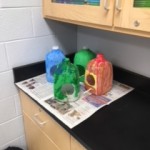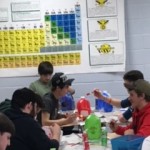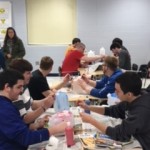Each week, Garth Adams and Alex Beer visit the Outdoor Education class at Letcher County Central High School to teach lessons about watershed health. Most recently, lessons have been focused on littering and its impact on water quality. In learning about how litter impairs waterways, students explored how to address the issue. One method of litter prevention is to reuse materials that might otherwise be littered or thrown away. To demonstrate this, Outdoor Education students made bird houses out of plastic gallon jugs and other re-purposed materials.
To go along with this lesson, students learned about the 10 most commonly littered items:
- Cigarette butts and filters
- Bags and food wrappers
- Caps and lids
- Beverage bottles
- Beverage cans
- Cups, plates, forks, knives, spoons
- Plastic bottles
- Straws and stirs
- Fast food containers
- Cigar tips
Students discussed how littering pollutes waterways. Here are some of the highlighted facts:
- Decomposing waste pollutes waterways.
- Local litter is washed into storm drains and directly into streams and rivers. This contributes to waste downstream and in the world’s oceans.
- Litter creates a chocking and suffocating hazard for animals and living creatures, disrupting food chains and ecosystems.
- Decaying litter decreases oxygen levels, impacting healthy stream habitats.
- Plastics, which make up 90% of litter, take hundreds of years to break down.
With the past few lessons students gained insight into the implications of litter and personal behaviors for decreasing waste. The lessons to come will focus on how to curb littering among other students, the community, and beyond.



